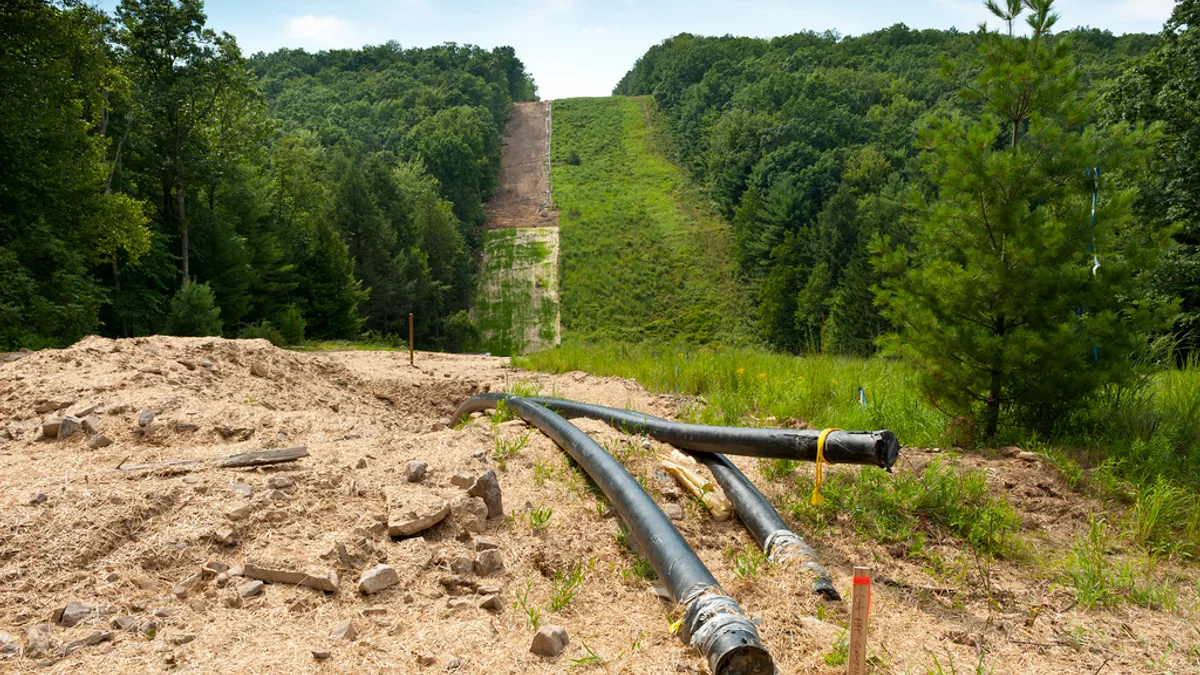Dive Brief:
- Kinder Morgan has filed plans with federal regulators for a $5 billion expansion of its Tennessee Gas Pipeline system, designed to move gas supplies from northern Pennsylvania to New York and New England markets, Forbes reports.
- The filing comes just days after Massachusetts Attorney General Maura Healey (D) released a study casting doubt on the need for pipeline capacity in the region, instead favoring investment in demand response and efficiency.
- Tennessee Gas, a Kinder subsidiary, responded to that study, calling the analysis "flawed" and predicting its recommendations would not lower power prices for consumers in the region.
Dive Insight:
Does New England need more natural gas? That's the question being fiercely debated in the region, and against that backdrop, Kinder Morgan has filed its plans to expand the Tennessee Gas pipeline into those markets.
The Northeast Energy Direct project has two components: the Supply Path and the Market Path. Over the summer, Kinder Morgan's board of directors authorized TGP to proceed with the NED Project Market Path component and a $3.3 billion investment. The company said that a determination has yet to be made on the Supply Path.
The Supply Path would have a maximum design capacity of 1.2 billion cubic feet per day (Bcf/d) and will run more than 130 miles in northern Pennsylvania to an interconnection with TGP’s 200 Line system and Iroquois Gas Transmission System in Wright, New York. It will also include approximately 41 miles of looping pipeline along TGP’s 300 Line in Bradford and Susquehanna counties in Pennsylvania.
The Market Path component would have capacity of 1.3 Bcf/d and would run almost 190 miles from Wright, to Dracut, Massachusetts. In addition, the project includes dive delivery laterals in Massachusetts and New Hampshire and one pipeline loop in Connecticut.
The project could be completed in the fourth quarter of 2018, the company said.
“The NED Project is a transformative project for the northeast United States,” Kinder Morgan East Region Natural Gas Pipelines President Kimberly Watson said in a statement. “Despite being just a few hundred miles from the most abundant and low-cost natural gas production area in the country, consumers in the Northeast pay some of the highest natural gas and electricity rates in the continental United States."
According to Watson, the higher power prices are due to a lack of natural gas pipeline infrastructure, especially to meet winter heating demand and power generation combined.
"In order to meet demand during the past two winters, New England’s electric generators have had to rely on high-priced natural gas, expensive imported LNG and costly fuel oil purchased on the spot market," Watson said. "In short, New England has insufficient natural gas pipeline capacity serving the region."
But according to Massachusetts AG Healey, the project is too expensive and unnecessary, as future demand can largely be met with demand management strategies. Her office has released a study casting doubt on the need for more natural gas pipeline capacity in New England, finding additional investment in demand response and efficiency is the cheapest and cleanest option to meet power demand.
The study found $146 million in net savings and 1.86 million tons of carbon dioxide avoided would be avoided if demand management is used rather than adding pipeline capacity.
According to Healey, a large gas pipeline would return savings of just $133 million while increasing emissions.
Tennessee Gas returned fire with a statement of its own last week, saying "the study paints an incomplete and inaccurate picture to reach its conclusions. Its findings are contradicted by every other analysis in a long line of public studies ... all of which found that Massachusetts and New England need substantially more natural gas capacity."














